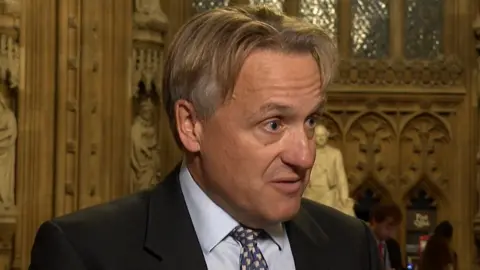Medals for MPs among ideas to attract fresh talent to Parliament
 Getty Images
Getty ImagesSpecial medals for MPs who are standing down or have been voted out are among suggestions to make the job more attractive to newcomers.
A committee of MPs claims a lack of job support for ex-politicians could put people off a career in Parliament.
Other ideas in their report include certificates for "core skills" gained as an MP to help them find work.
Ex-MPs should also get 18 months of job advice and support to avoid a post-politics "career cliff", it adds.
Conservative MP Sir Charles Walker, who chairs the Commons administration committee, said: "If the public wants the best individuals to represent them in the House of Commons, it is vital that MPs receive the support they need to do - and leave - their jobs well."
Sir Charles, who is standing down as an MP himself at the next election, after 15 years representing Broxbourne, in Hertfordshire, said political parties also had a duty to ensure Parliament "can attract and retain talented people of all different backgrounds from across the UK".
'Political baggage'
Some MPs had struggled to plan for their career after politics, and found it difficult to explain their skills to potential employers. according to the committee's research.
It had also heard evidence that the public nature of being an MP, and their "political baggage", could hinder their chances of landing a job in some lines of work.

The committee said the Commons authorities should work with colleges and universities to fund "certified micro-qualifications" for MPs to record the skills they gain in Parliament.
It also suggested departing MPs could be allowed to attend a special ceremony to mark their contribution to public life.
"This could be an event with family and friends and/or presentation with a medallion of service," it added, with eligibility to be decided by Commons bosses.
Large sums
MPs are paid a basic salary of £84,144, and receive expenses to cover office costs, employing staff, and having to stay in London.
BBC Research in November 2021 found more than 200 of the 650 MPs declared earnings on top of this, ranging from £50 a year to almost £1m.
Ministers and prime ministers earn a bigger salary - and few ex-PMs struggle for work when they leave politics, with some earning large sums from public speaking, book deals and seats on company boards.
Others, such as former chancellor George Osborne, who famously had as many as eight jobs at one time, and former deputy prime minister Sir Nick Clegg, who is a top executive at Meta, parent company of Facebook, have enjoyed lucrative post-politics careers.
Less is known about the post-politics activities of lower-profile MPs.
One academic survey of MPs who left Parliament after the 2010 election found almost half of those aged under 65, who responded, took at least three months to find a new job, with one in 10 taking a full year.
Although half were earning more than they had done in Parliament, 40% earned less and 10% the same as their MPs' salary.
Those landing well-paid directorships were a "minority", although the survey was carried out in the wake of the 2009 expenses scandal, which was acknowledged by the researchers.
In its report, the committee said the Commons authorities should commission "empirical data" on MPs' post-politics careers to help improve careers support.
